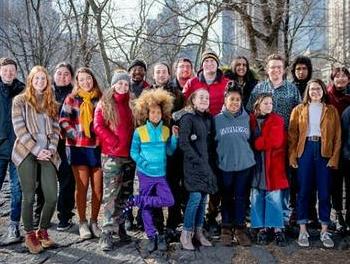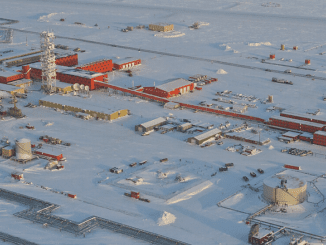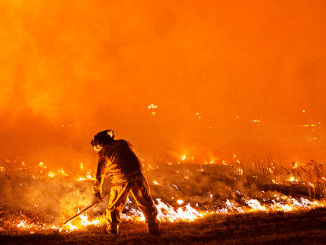
EUGENE, Oregon, January 25, 2021 (ENS) – Climate change is worsening by the year, threatening to make the planet unliveable for people now in their teens and early twenties. Because government actions are often at the root of climate warming, young Americans have taken the first legal steps in a youth climate movement to require the government to respect their right to a stable, healthy climate, encouraging similar actions globally.
Today, there are many youth climate cases before courts across the world in which young people are pressing their governments to take actions that will mitigate the effects of climate change.
Our Children’s Trust is a nonprofit public interest law firm based in Eugene that is suing the U.S. government for violating the rights of young people generally and, in particular, violating the rights of the 21 young plaintiffs in the landmark case Juliana v. United States.

Founded in 2010 by attorney Julia Olson, Our Children’s Trust seeks to secure the rights of future generations to a safe climate by taking legal action and with climate information campaigns.
While Our Children’s Trust has filed several lawsuits against the United States government, the lawsuit Juliana v. United States has gotten the most coverage.
This case has been so groundbreaking and attention-grabbing because of its uniqueness as the first legal case to be brought to the U.S. courts by young people who are fighting to protect their natural right to a healthy climate.
The legal action by the young plaintiffs asserts that the federal government violated their constitutional rights by causing dangerous carbon dioxide concentrations in the atmosphere.
The 21 plaintiffs, who range in age from 13 to 24, are citizens from across the United States who were contacted by Our Children’s Trust after they had demonstrated an interest in the climate.
“We’re like a big family,” said one of the plaintiffs, Sahara Valentine, a high school student in Eugene.
Juliana v. United States was filed by the 21 plaintiffs in 2015. They complain that “through the government’s affirmative actions that cause climate change, it has violated the youngest generation’s constitutional rights to life, liberty, and property, as well as failed to protect essential public trust resources,” Our Children’s Trust explains on its website.
The case was first argued in the U.S. District Court for the District of Oregon in 2017.
After many legal maneuvers that resulted in the court preserving the right of the young plaintiffs to argue their case, in February 2019 Our Children’s Trust attorneys filed a motion for a preliminary injunction with the Ninth Circuit Court of Appeals to prevent the federal government from issuing leases and mining permits for extracting the coal on federal public lands, leases for offshore oil and gas exploration and extraction activities, and federal approvals for new fossil fuel infrastructure while the government’s early appeal of the case was being heard.

In March 2019, members of Congress, legal scholars, religious and women’s groups, businesses, historians, medical doctors, international lawyers, environmentalists, and more than 32,000 young people under the age of 25 – filed briefs as friends of the court demonstrating support for the case to proceed to trial.
In March 2020, a three-judge panel of the Ninth Circuit Court of Appeals issued an order in which they recognized the gravity of the evidence on the plaintiffs’ injuries from climate change, the government’s role in causing them, and that the government is violating the plaintiffs’ constitutional rights.
However, two of the three judges also “reluctantly” concluded that the plaintiffs’ requested remedies should be addressed by the executive and legislative branches rather than the courts. The third judge, Judge Josephine Staton, affirmed the youths’ constitutional climate rights in a powerful dissent.
The plaintiffs have appealed that ruling, requesting a rehearing before all the judges of the Ninth Circuit Court of Appeals, known as an en banc hearing.
If the request for the case to be heard en banc is approved by the Ninth Circuit Court of Appeals, then it will remain in the Ninth Circuit and the case will be argued before that court.
But if the request for en banc review is denied, then the case will continue on to the United States Supreme Court.

As Juliana v. United States slowly makes its way through the courts, the climate is heating quickly. The year 2020 was one of the three warmest on record, and rivaled 2016 for the top spot, according to a consolidation of five leading international datasets by the World Meteorological Organization, WMO.
“The confirmation by the World Meteorological Organization (WMO) that 2020 was one of the warmest years on record is yet another stark reminder of the relentless pace of climate change, which is destroying lives and livelihoods across our planet,” said UN Secretary-General António Guterres.
An ongoing temperature analysis conducted by scientists at NASA’s Goddard Institute for Space Studies shows that the average global temperature on Earth has increased by a little more than 1° Celsius (2° Fahrenheit) since 1880. Two-thirds of the warming has occurred since 1975. This global warming has affected every living creature on earth.
Human actions appear to be at the root of the current climate crisis as oil, gas, and coal burned for heat and transportation emit heat-trapping greenhouse gases into the atmosphere, and millions of trees cut for lumber and land conversion from forest to agriculture no longer offer a carbon sink.
In 2019, about 43.1 billion tons of CO2 from human activities were emitted into the atmosphere. This was an all-time high, breaking the previous record from 2018, according to the website The World Counts, which runs a continuous tally of CO2 emissions.
Younger generations will be affected the most as they will likely live to witness climate change as it engulfs the planet with wildfires, hurricanes, mass extinctions, and rising sea levels.

“Essentially because climate change disproportionately impacts young people, by pursuing policies that cause climate change and a fossil fuel energy system, the government is discriminating against children and causing them disproportionate harms,” Andrea Rodgers, a senior litigation attorney with Our Children’s Trust, said.
While the court cases have gained momentum, Rodgers finds the waiting period between decisions on the lawsuit to be one of the most challenging obstacles.
“Justice is slow and the court system is slow. It is really hard to be waiting while you see the devastating effects of climate change happening outside your window… It’s hard to be patient when you’re staring down such a significant crisis like climate change,” said Rodgers.
All of the 21 plaintiffs in Juliana v. United States have different stories for how they got involved but one plaintiff, Sahara Valentine, has a story similar to 11 other plaintiffs who are also from Oregon.
When Valentine was 10-years-old, she and other future plaintiffs attended a summer camp focused on the climate change crisis that Olson was involved in.
After the camp, Valentine became an active member of her community by testifying before the Eugene city council and was shortly after contacted by Olson asking if she wanted to be a plaintiff with Our Children’s Trust.
“I was really inspired after I learned what the climate crisis entailed and how it affected not only humans but also animals and beautiful faces of nature that I am yet to discover. The idea that future generations would not be able to experience the same things that I get to experience and the idea that the world is slowly dying and we’re at fault, inspired me to get involved,” said Valentine.

Valentine is a unique plaintiff because she has asthma and is, therefore, able to advocate for the protection of the climate from that point of view. She serves as an example of how health issues worsen when the climate is in bad condition.
Most of the plaintiffs have unique perspectives on how climate change will personally affect them, through health issues or climate change impacts that have already started to affect them, making these plaintiffs more anxious to fight for the protection of their planet, for themselves and others.
Our Children’s Trust worked on another climate lawsuit with an interesting outcome – Chernaik v. Brown, with two plaintiffs – Olivia Chernaik and Kelsey Juliana, the lead plaintiff from Juliana v. United States.
Chernaik v. Brown was filed in 2011 against the State of Oregon for not protecting the state’s natural and essential resources.
On October 22, 2020, Chernaik v. Brown was heard by the Oregon Supreme Court, where Our Childrens’ Trust lawyers argued that the State of Oregon must protect the rights of young people to healthy land and water under the public trust doctrine.
The Oregon Supreme Court ruled that the public trust doctrine does not apply to atmospheric or natural resource protection from climate change harm.
But Oregon Supreme Court Chief Justice Martha Walters dissented from this ruling as she recognized that the state has a duty to protect its natural resources under the public trust doctrine, which ensures that the public has a continuing ability to use and enjoy navigable waters and the submerged and submersible lands underlying those waters.
Both Rodgers and Valentine believe that if the lawsuits presented by Our Children’s Trust are successful, the government will start to hear young voices in a new and more positive light.
“Young people are in a very difficult position because they are going to feel the worst impacts of climate change and most of them can’t vote,” said Rodgers. “I think that’s why you need the judicial branch to step in and declare children’s rights in the face of this crisis.”
Lawsuits pressing the rights of young people to a healthy climate are proliferating throughout the world.
In Mexico, the case Youth v. Government of Mexico features young people seeking climate action by the federal government.
In Canada, the lawsuit La Rose v. Her Majesty the Queen now in the Federal Court of Appeal revolves around young Canadians seeking declarations that Canada violated their rights by failing to take sufficient action on climate change, and an order requiring the government to implement a Climate Recovery Plan.
And in Pakistan, the case Maria Khan et al. v. Federation of Pakistan et al. before the Punjab Lahore High Court seeks to determine whether the government of Pakistan’s inaction on climate change violated the constitutional rights of women and future generations including the right to a healthy environment and a climate capable of supporting human life
To learn more about youth climate action cases before courts across the globe, click here.
— By Georgia Seidman
Copyright Environment News Service (ENS) 2021. All rights reserved.



